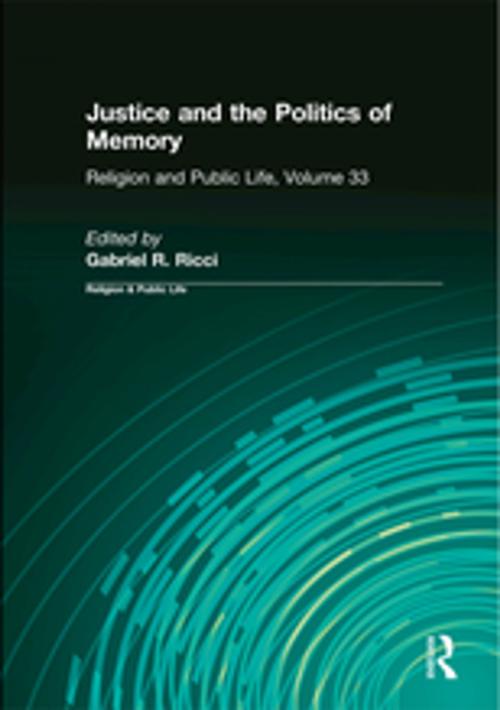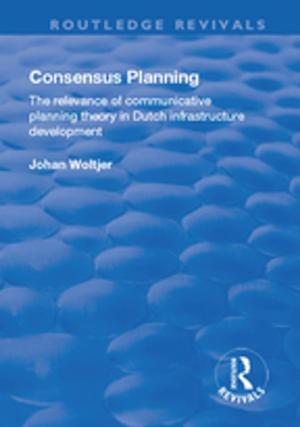| Author: | ISBN: | 9781351510363 | |
| Publisher: | Taylor and Francis | Publication: | October 24, 2017 |
| Imprint: | Routledge | Language: | English |
| Author: | |
| ISBN: | 9781351510363 |
| Publisher: | Taylor and Francis |
| Publication: | October 24, 2017 |
| Imprint: | Routledge |
| Language: | English |
Memory is not a mere repository for past events. This was Henri Bergson's fundamental claim about consciousness. In distinguishing our psychic constitution by its sense of the past, Bergson differentiates our perception of time from a process in which one instant merely replaces another. While Bergson cast his ideas in terms of the biological sciences, his analysis did not neglect the moral impulse that accompanies the condensation of history with which we continuously live. Classifying human existence in this way bears on ethical and political questions. How such questions can plague the memory of a people and the entire human community is addressed in Justice and the Politics of Memory. The contributors explore the manner in which cultural and psychic violation undermine collective identity, and destroy traditions. They raise troubling questions on how recompense and reconciliation is possible after abominable wrongs have been systematically perpetrated against a community. Faced with the burden of memory, those committed to the righting of wrongs are faced with pursuing an elusive justice that sometimes includes levying reparations and memorializing horrific historical episodes. Guided by the muse of forgiveness, restoration and a more harmonious future are likely to be rooted in the sources of spirituality that had been previously eclipsed by the conquering and homogenizing historical processes. This volume includes Heribert Adam's "Collective Reckoning with a Criminal Regime," Jeffrey Olick's "Lessons from and for Germany," James Hatley's "Levinas, Witness and Politics," James E. Young's "Germany's Holocaust Memorial Problem--and Mine," Tim Giago's "Killing the Indian to Save the Child: The Near Death of Spirituality," Jordan B. Peterson's and Maja Djikic's "Running Ahead: You Can Neither Remember Nor Forget What You Do Not Understand," Derick Wilson's "Where Religion Confuses yet Faith Gives Hope: Conflict Resolution in Northern Ireland," and Leonard Kaplan's "Justice Perfected: Cinematic Exemplifications," and an introduction, "Morality and Memory," by the editor.
Memory is not a mere repository for past events. This was Henri Bergson's fundamental claim about consciousness. In distinguishing our psychic constitution by its sense of the past, Bergson differentiates our perception of time from a process in which one instant merely replaces another. While Bergson cast his ideas in terms of the biological sciences, his analysis did not neglect the moral impulse that accompanies the condensation of history with which we continuously live. Classifying human existence in this way bears on ethical and political questions. How such questions can plague the memory of a people and the entire human community is addressed in Justice and the Politics of Memory. The contributors explore the manner in which cultural and psychic violation undermine collective identity, and destroy traditions. They raise troubling questions on how recompense and reconciliation is possible after abominable wrongs have been systematically perpetrated against a community. Faced with the burden of memory, those committed to the righting of wrongs are faced with pursuing an elusive justice that sometimes includes levying reparations and memorializing horrific historical episodes. Guided by the muse of forgiveness, restoration and a more harmonious future are likely to be rooted in the sources of spirituality that had been previously eclipsed by the conquering and homogenizing historical processes. This volume includes Heribert Adam's "Collective Reckoning with a Criminal Regime," Jeffrey Olick's "Lessons from and for Germany," James Hatley's "Levinas, Witness and Politics," James E. Young's "Germany's Holocaust Memorial Problem--and Mine," Tim Giago's "Killing the Indian to Save the Child: The Near Death of Spirituality," Jordan B. Peterson's and Maja Djikic's "Running Ahead: You Can Neither Remember Nor Forget What You Do Not Understand," Derick Wilson's "Where Religion Confuses yet Faith Gives Hope: Conflict Resolution in Northern Ireland," and Leonard Kaplan's "Justice Perfected: Cinematic Exemplifications," and an introduction, "Morality and Memory," by the editor.















